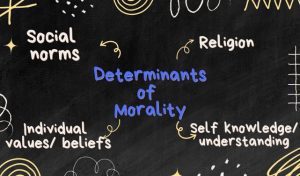
-
- Social norms are unwritten standards of behavior which guide behavior of people. They are based on tradition, culture, custom and practices of society which have evolved with the evolution of society. Since social norms are derived from society, they become a sort of foundation for all other values & standards including moral and ethical standards.
- When values are analyzed from rightness / wrongness perspective, when moral elements come in values & standards of behavior that some individual standards would be nothing but moral standards and in that case values guide model behavior.
- All religions have their own philosophical principles for which they are known. These philosophical values are also universal principles of ethics like truth, forgiveness, compassion, equality, dutifulness & selflessness although religions can have other values & practices may not necessarily be universal. They can be more known as the social morality of that religion.
- Self-knowledge is pivotal in shaping morality. Understanding one’s values, motivations and empathy for others enables informed ethical choices. It fosters moral consistency, integrity and personal growth ensuring one’s actions align with deeply held principles and contribute to the well-being of all.
How morality & immorality is continuously debated in society:
-
-
-
- Individual differences
- Changes in society/transitional nature of society
- Emergence of new issues
- Pursuit of Critical thinking
- Advancement in society
-
-
Example 1: Gay marriage is viewed as an example of evolving moral standards. It reflects societal values to watch equality, acceptance in individual rights. As society is increasingly recognising and supporting the right of individuals to marry whomever they want, it reflects a shift towards inclusivity and fairness. This demonstrates how notions of morality can adapt and expand to embrace diversity and promote equal treatment for all. But, but there are individuals including public figures like Ramdev, who are opposed to the gay marriage, considering it immoral based on their religious and cultural beliefs.
Example 2: In India, affirmative action policies have been implemented to provide reservation quotas in educational institutions & government jobs for individuals from backward caste. Forward caste individuals who may not benefit from these reservations may express disagreement with this policy. This leads to friction and heated discussions between the groups. But such debates are crucial for addressing historical inequalities and finding a balance between social justice and equal opportunities in education and employment.
Example 3: In Indian society which has largely been a patriarchal society is now facing a lot of friction as people and government have started emphasizing on the rights of women. The Supreme Court progressive judgements like Sabarimala & triple talaq are examples of such developments.
Concept: Constitutional Morality
Definition
The ideals which guide the relationship between government and the governed are considered as constitutional morality. The ‘shared values’ have following characteristics:
-
-
- Respecting the Constitution
- Promoting free speech
- Obligation of the government and its machinery to act as per Constitution
- People contesting for political power and their opposition should have reverence for the Constitution.
-
| BR Ambedkar defined it as “ The concept of constitutional morality implied the harmonious interaction between the governing and the governed, including the peaceful settlement of the dissent faced from the latter & conflict of interest arising between them, without indulging in any major confrontation or resorting to violent revolution”. |
Relevance
-
-
- It is universal since it is based on rational principles. Everyone is treated equally & is entitled for the same dignity and respect.
- It represents modern liberal values based on rationality & scientific temper imbibing ideals of modern liberal democracy like liberty, equality, freedom, justice and fraternity.
- The foundation of constitutional morality is the Constitution itself, which is based on the morality of the framers of the constitution. Indian constitutional morality although influenced by modern liberal values but at the same time, it also protects diversity (DPSP’s), religious freedom (FR). It works as a binding force so that society is viewed together even if it has different religion, caste & sects.
- Constitutional morality is important for any society to give liberty, equality and freedom to its citizens.
- Democratic education of people and awareness among people is important for constitutional morality.
- It is constitutional morality which guides constitutionalism.
- It was given importance by Ambedkar in his speech in 1948, when he remarked that “ Democracy is a top dressing & Indian society is undemocratic. It is the constitutional morality which would make society more democratic”.
-
Example
-
-
- It was based on constitutional morality that same-sex relations were made lawful.
- In the Sabarimala case, the Supreme Court went to support constitutional morality over social morality.
- In the NCT Delhi case , CJI Dipak Misra stated constitutional morality as second basic structure doctrine.
-
Spread the Word




